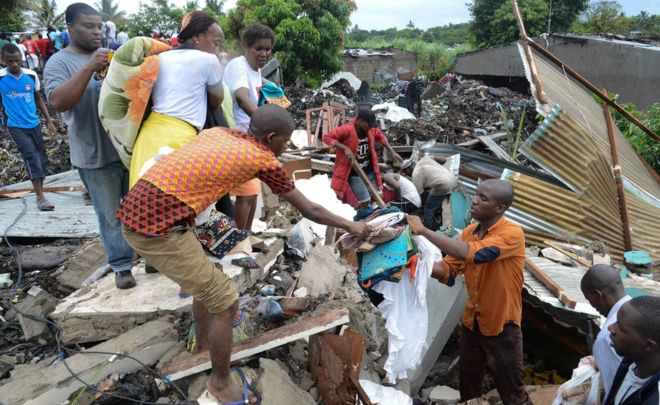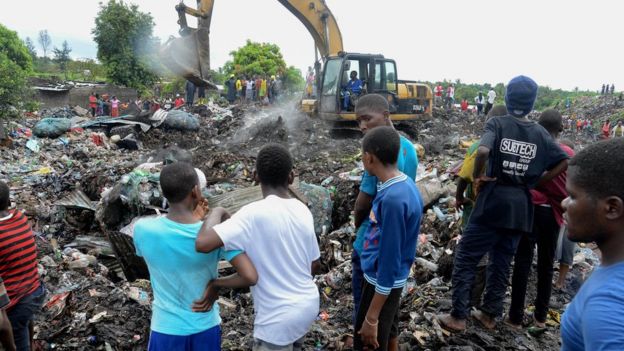Mozambique's Rubbish Dump Tragedy
Mozambique rubbish dump collapse 'kills at least 17' people
 Image copyrightEPAImage captionAuthorities have warned that a number of residents remain unaccounted for
Image copyrightEPAImage captionAuthorities have warned that a number of residents remain unaccounted forAt least 17 people have been killed in Mozambique's capital, Maputo, and many more injured after a huge mound of rubbish collapsed, officials say.
The pile of waste, some 15m (49ft) high, gave way in heavy rains at 03:00 local time (01:00 GMT) on Monday.
The dump is known to be home to some of the city's poorest residents, who build makeshift camps amid the rubbish.
Five homes on the edge were also crushed in the disaster. Rescue workers are continuing to search for survivors.
A spokesman for the emergency services, Leonilde Pelembe, warned it was likely there were more victims under the waste.
"The information we received from local authorities is that the number of people living in those houses exceeds the number of deaths recorded," Mr Pelembe said.
The Hulene district of Maputo is one of the most deprived parts of the capital. Many, including children, have little choice but to make their homes either on or next to the dump.
The dump not only provides them with food, but also goods to sell, our correspondent Jose Tembe explains.

An accident waiting to happen
Analysis by Jose Tembe, BBC Africa, Maputo
The dump was here when I began living in the area in the 1980s. I saw the buildings being erected around it.The municipal authorities have tried to clear it. Each time the rainy season comes, they remove people and give them plots of land.
 Image copyrightEPAImage captionRescue workers clear rubbish as they continue to search for survivors
Image copyrightEPAImage captionRescue workers clear rubbish as they continue to search for survivorsBut when there is no rain, people move back to the rubbish dump. It is where they can be close to the city and collect things that have been dumped - things like outdated food to either eat or sell.
The government keeps on promising and promising to close the dump for good, but they never do it.
They never close it, and so people continue to pile garbage in the same area.

The authorities said they had previously asked residents in the area to leave because their homes were constructed illegally, Reuters news agency reports.
However one local resident whose son was injured in the landslide, Maria Huo, said: "I live in this neighbourhood because I have nowhere to go. Had the government told me to go to another place to live, I would have left here."
The city of Maputo has experienced heavy rainfall since Sunday, which has damaged homes and flooded roads.
In the poorer suburbs of cities such as Maputo, people sometimes live on land they do not own in the hope of finding work. The dwellings can be built on land that is unsafe.
RESPONSE:
Bias: I think that
this article is presented pretty well not having a lot of bias against or for
anyone. However, from the article overall there is a slight bias against the
government, hinting that they could have done more for the people.
Audience: I think
that the main audience for this is many developing countries, mainly to inform
them of the situations and also to warn them of disasters that can happen from
poor management and poor leadership from the government. I think that it would
also be directed to mainly the people in leadership in these developing
countries so that their eyes can be awakened to see the harm that can come and
enlighten them to start thinking about how they can help people like these
people in the article in their own country.
Opinion: I think
that this is such a tragedy that no one should go through. The fact that many
of these people choose to live at the dump site, quite possibly knowing the
dangerous, just so that they can survive.
Even going further, many of these people don't have a choice because it
is their only means for survival.
I think that it is
great the government has been trying to do something, like giving them a plot
of land that is away from the dump site, however, if they don't do anything
more, like helping them build their livelihood, then what is the government
really doing for these people? I think that the government and even the society
around should pitch in to help them get back on their feet not only giving them
a new place to live but giving them a new way of surviving, like jobs, helping
them build a business, or anything that will enable them to start their journey
out of poverty.
Comments
Post a Comment